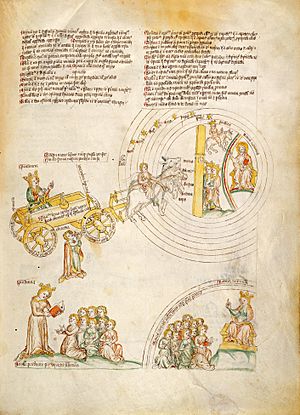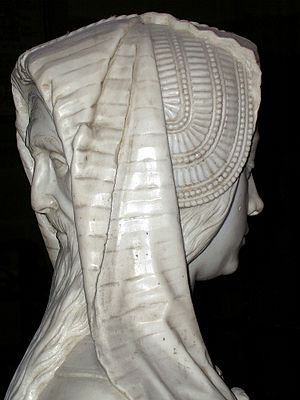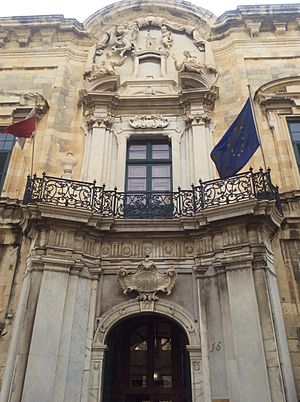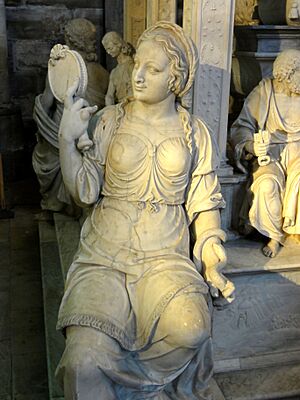Prudence facts for kids

Prudence (from Latin prudentia, meaning "seeing ahead" or "wisdom") is the ability to guide and control yourself using reason. It is seen as a very important quality, or virtue. Prudence is one of the four main "cardinal virtues." These, along with three "theological virtues," make up the seven virtues.
Prudentia is often shown as a female figure. She usually carries a mirror and a snake. She is often seen with Justitia, the Roman goddess of Justice.
The word "prudence" comes from the 14th-century Old French word prudence. This word also comes from the Latin prudentia, meaning "foresight" or "wisdom." Prudence is often linked with wisdom, insight, and knowledge. It helps you decide what is right or wrong to do. This is not just in general, but also in specific situations.
Prudence itself does not make you act. It is about knowing what to do. But all other good qualities need prudence to guide them. For example, deciding if an action is truly courageous, or just reckless or cowardly, is an act of prudence. This is why it is called a "cardinal" (or pivotal) virtue.
In modern English, "prudence" often means being careful. This kind of carefulness is good when it helps you avoid unnecessary risks. But if you are too careful, it can become the bad quality of cowardice.
In his book Nicomachean Ethics, Aristotle wrote a lot about a virtue called phronesis. This word is usually translated as "prudence." More recently, phronesis has been called "practical wisdom" or "rational choice."
Contents
Prudence: The Guide for Good Choices

Ancient Greeks and later Christian thinkers like Thomas Aquinas saw prudence as the "mother" of all virtues. They believed it was the cause, measure, and form of all good qualities. It is called the auriga virtutum, which means the "charioteer of the virtues." Epicurus also mentioned prudence as the most important good. He said it was "the source of every other excellence."
Prudence helps people make good decisions. For example, a person can be temperate (balanced) if they learn to make good choices about their desires.
Prudence helps you figure out the right action in any situation. It does not make you want to do good, but it shows you the way. Prudence guides other virtues. It helps them know where and how to act. Without prudence, bravery can become foolishness. Mercy can turn into weakness. Kindness can become criticism. Humility can become self-importance. Selflessness can lead to bad outcomes. And temperance can become too extreme. Prudence helps you find the right balance for good actions. It helps you decide the right time, place, and way to do things.
Prudence is also seen as the standard for good actions. Just like an artist's work is good when it matches their idea, a person's actions are good when they match the idea of prudence.
In Greek and Scholastic philosophy, "form" means what makes something what it is. Prudence gives other virtues their true meaning. For example, not every time you tell the truth is an act of honesty. What makes telling the truth a virtue is whether it is done with prudence.
Prudence Versus Cunning and False Wisdom
In Christian belief, prudence is different from cunning. This difference depends on why a decision is made. Christian belief includes the idea of God, natural law, and the moral meaning of human actions. In this view, prudence considers what is good for the soul. For example, early Christians who chose to be martyred rather than deny their faith were seen as acting prudently.
According to Thomas Aquinas, decisions made for bad reasons or using bad ways are not truly prudent. He called them "cunning" or "false prudence."
The ancient Greek word for prudence also means "forethought." The Greeks believed people needed enough prudence to prepare for worshiping their gods.
Key Parts of Prudence

Prudence means applying general rules to specific situations. In Scholastic philosophy, "integral parts" are the things needed for a virtue to be complete. Here are the key parts of prudence:
- Memoria: Having an accurate memory. This means remembering things as they truly happened and learning from past experiences.
- Docilitas: Being open-minded. This means being able to learn from others and use their advice.
- Intelligentia: Understanding basic rules and ideas.
- Sollertia: Being quick-witted or clever. This is the ability to understand a situation quickly.
- Ratio: Being able to think things through. This includes researching and comparing different choices.
- Providentia: Having foresight. This is the ability to guess if certain actions will help you reach your goals.
- Circumspection: Being able to consider all the important details of a situation.
- Caution: Being able to reduce risks.
Making Wise Choices

In ethics, a "prudential judgment" is a decision where you must weigh different facts. You decide the best action based on the situation. Often, two people could look at the same facts and make different, but still ethical, choices.
For example, in the idea of a just war, a government must decide if the harm they are suffering is worse than the harm that would come from going to war. The decision to go to war is a prudential judgment.
Another example: a patient with a serious illness might hear about a new experimental treatment. To decide whether to try it, they would weigh the costs, time, possible pain, and risk of no benefit. They would also consider the possible good outcome and what others might learn from their case.
Prudence in Speaking

Phronesis, or practical wisdom, is very important in rhetorical theory. Rhetoric is the art of speaking or writing effectively. Aristotle believed that phronesis and rhetoric both deal with making decisions about uncertain things.
Cicero defined prudentia as a rule for good speaking. He said that young people often act without thinking of the results. But those with prudens (prudence) knew when to speak and when to be quiet. Cicero believed prudence came only from experience. He said it was used in everyday talk, but in public speeches, it was part of a bigger idea of wisdom.
Today, experts in rhetoric still study prudence. They agree that prudence cannot be found in a set of timeless rules. Instead, a speaker should use their judgment and careful thought to decide what values to use. They also say it is vital to consider the specific details of each situation. For example, scholar Lois Self explains that both rhetoric and phronesis involve making choices. They both need careful thought about specific situations. And they both help the public good.
Robert Hariman adds that good speaking also includes artistic feeling, copying good examples, and changing things as needed.
There are small differences among scholars about how to define prudence. Hans-Georg Gadamer thought prudence appears when you apply rules. He believed it could be judged that way. But James Jasinski argues that prudence cannot be measured by simple results. He says it is judged by the skill of the communication in its culture.
In his study of Machiavelli, Eugene Garver looked at prudence and moderation. He believes there is a middle ground between strict rules and only caring about results. He says prudence means changing moderation into a fitting response. This makes it a flexible rule for different situations. Garver also says that prudential thinking is different from other types of thinking. This is because it is rooted in a community where problems arise that need wise choices.
|
See also
 In Spanish: Prudencia para niños
In Spanish: Prudencia para niños
 | Stephanie Wilson |
 | Charles Bolden |
 | Ronald McNair |
 | Frederick D. Gregory |



